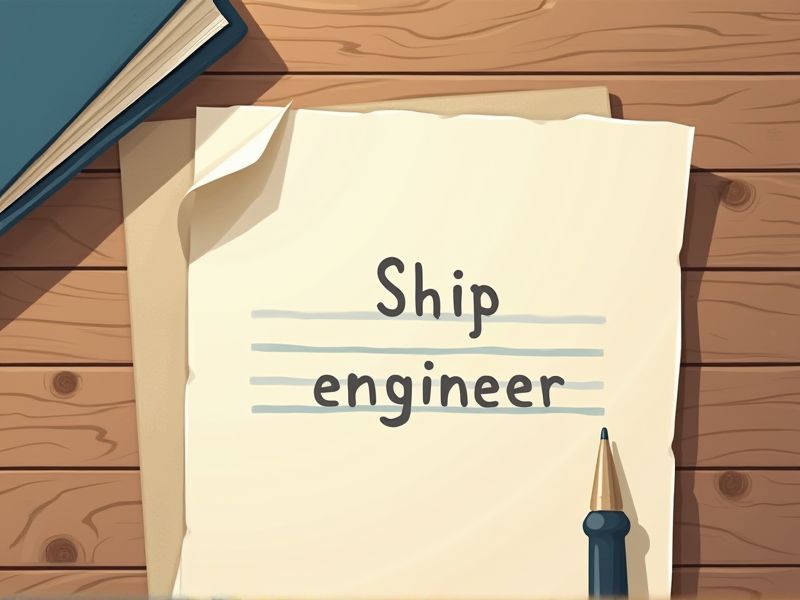
Ship engineers are responsible for ensuring the safety and efficiency of a vessel's operations, necessitating specialized knowledge and skills. Their work involves complex machinery and systems, thus requiring certifications that validate their expertise in handling such technology. These certifications also help maintain industry standards and compliance with international maritime regulations. Here are some important certifications you might need as a ship engineer.
STCW Basic Safety Training
STCW Basic Safety Training equips ship engineers with essential safety skills, reducing the risk of accidents at sea. This training fulfills international maritime regulations, ensuring engineers are compliant and can work globally. It enhances the ability to respond effectively to emergencies, protecting both crew and vessel. Knowledge gained in this training promotes a safer working environment, leading to improved operational efficiency.
STCW Advanced Fire Fighting Certificate
The STCW Advanced Fire Fighting Certificate equips ship engineers with specialized skills to effectively manage and extinguish complex on-board fires. By having this certification, engineers are better prepared to handle emergencies, reducing the risk of severe damage and loss of life. The training involves learning advanced techniques and safety protocols, which ensures compliance with international maritime safety regulations. Shipowners and insurers favor hiring certified personnel because it minimizes operational risks and potential liabilities.
STCW Proficiency in Survival Craft and Rescue Boats Certificate
The STCW Proficiency in Survival Craft and Rescue Boats Certificate equips ship engineers with essential survival skills for emergency situations at sea. These skills enhance their ability to assist in deploying and operating life-saving equipment, crucial in life-threatening scenarios. A certified engineer contributes to improved vessel safety protocols, promoting a safer environment for all aboard. The certification aligns with international maritime regulations, ensuring consistent safety standards across global shipping operations.
Certificate of Competency (COC) - Marine Engineering
The Certificate of Competency (COC) in Marine Engineering ensures that ship engineers possess the necessary skills and knowledge, which directly impacts the safety and operational efficiency of maritime vessels. Regulating bodies, such as the International Maritime Organization, mandate the COC to uphold standardized qualifications globally, reducing risks of accidents and malfunctions. The certification process involves rigorous training and examinations, affirming the engineer's capability to handle complex machinery and systems onboard. With the issuance of a COC, employers have assurance in the competence and expertise of the engineers they hire, fostering trust and reliability in maritime operations.
Engine Room Simulator Training Certification
The Engine Room Simulator Training Certification enhances the practical skills of ship engineers, leading to improved operational efficiency. It provides a risk-free environment to practice and master emergency response, reducing on-board accidents. Certification ensures engineers are up-to-date with technological advancements, aligning with international maritime standards. Regulatory compliance is achieved, fulfilling requirements established by organizations like the International Maritime Organization (IMO).
Marine Pollution Prevention (MARPOL) Certificate
The MARPOL Certificate is essential for ship engineers because it ensures compliance with international regulations aimed at minimizing pollution from ships, which helps protect marine ecosystems. Holding this certificate indicates that the ship's equipment and operational procedures meet environmental standards, reducing the ship's ecological footprint. Ship engineers with the certificate are better equipped to implement and maintain practices that prevent oil, garbage, and sewage discharge into the ocean. This certification fosters a culture of environmental responsibility, aligning the maritime industry with global sustainability goals.
Ship Security Officer (SSO) Certification
Ship engineers need Ship Security Officer (SSO) Certification because it ensures they are trained to identify and manage security threats on board, crucial for the safety of all crew and cargo. It provides them with skills to implement and maintain ship security plans, a responsibility not limited to security personnel alone. With heightened global maritime security regulations, engineers must be equipped to respond effectively to potential risks. Certification fosters a collaborative environment where the entire crew can work together to prevent and address incidents.
Maritime English Proficiency Certification
Maritime English Proficiency Certification is needed for ship engineers because it ensures effective communication, reducing miscommunication risks in critical situations. Standardized language proficiency plays a vital role in adhering to international safety and operational guidelines, minimizing potential errors. Uniform language skills among crew members facilitate smoother teamwork and coordination during complex engineering tasks. This certification enhances the engineer's credibility and employability in the global maritime industry.
Crew Resource Management (CRM) Certification
Communication failures can lead to significant safety risks, so obtaining a Crew Resource Management (CRM) Certification helps ship engineers enhance effective communication with the crew. CRM training equips engineers with the decision-making skills necessary in high-pressure situations, reducing the likelihood of human error. The certification also emphasizes teamwork, ensuring that engineers collaborate efficiently for smooth operations aboard the ship. Understanding human factors through CRM aids in better stress management, leading to improved performance and safety standards in maritime operations.
Emergency Engine Room Management Training Certification
Emergency Engine Room Management Training Certification is critical for ship engineers due to the high-risk nature of maritime operations, ensuring they are prepared for unforeseen incidents. Ship engineers with this certification enhance onboard safety by effectively managing engine room emergencies. Insurance and regulatory bodies often require this certification, influencing a ship's operational compliance and insurance premiums. The certification aids engineers in mastering both technical and leadership skills, crucial for coordinating crew responses during crises.
Summary
With new certifications, you enhance your knowledge and skills, leading to improved problem-solving capabilities on the ship. Your qualifications likely increase employment opportunities, making you a more attractive candidate for higher positions. You also contribute to safer and more efficient marine operations by applying industry standards and best practices. Your career advancement potential rises, offering better salary prospects and job satisfaction.
